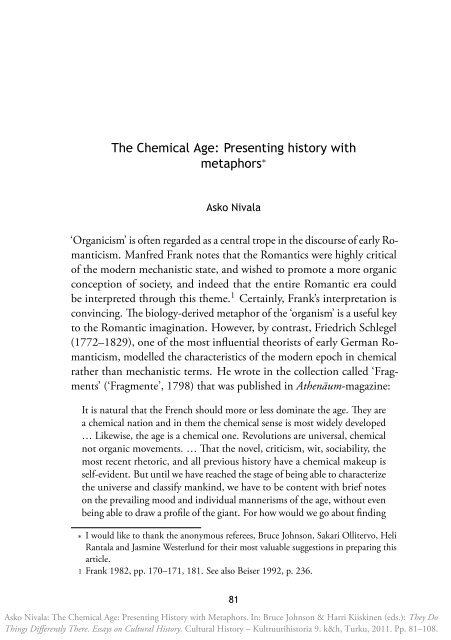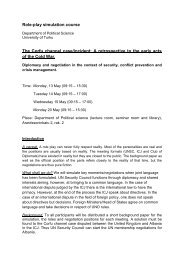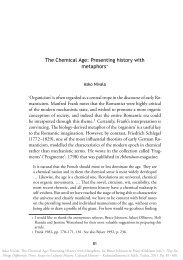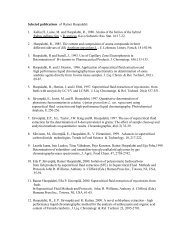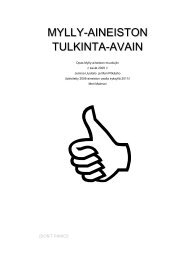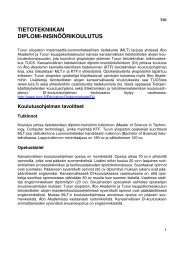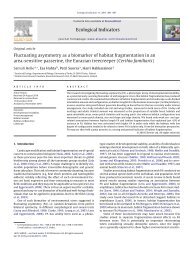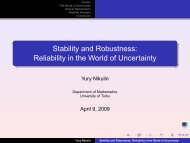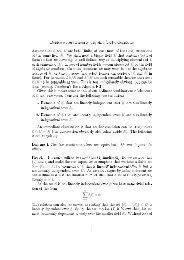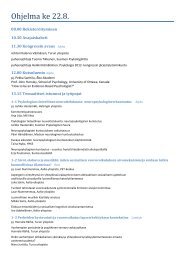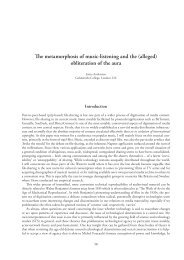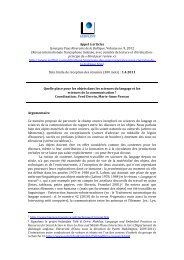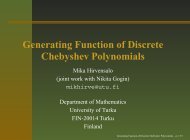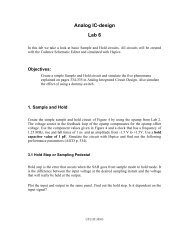The Chemical Age: Presenting history with metaphors∗
The Chemical Age: Presenting history with metaphors∗
The Chemical Age: Presenting history with metaphors∗
Create successful ePaper yourself
Turn your PDF publications into a flip-book with our unique Google optimized e-Paper software.
<strong>The</strong> <strong>Chemical</strong> <strong>Age</strong>: <strong>Presenting</strong> <strong>history</strong> <strong>with</strong>metaphors ∗Asko Nivala‘Organicism’ is often regarded as a central trope in the discourse of early Romanticism.Manfred Frank notes that the Romantics were highly criticalof the modern mechanistic state, and wished to promote a more organicconception of society, and indeed that the entire Romantic era couldbe interpreted through this theme. 1 Certainly, Frank’s interpretation isconvincing. <strong>The</strong> biology-derived metaphor of the ‘organism’ is a useful keyto the Romantic imagination. However, by contrast, Friedrich Schlegel(1772–1829), one of the most influential theorists of early German Romanticism,modelled the characteristics of the modern epoch in chemicalrather than mechanistic terms. He wrote in the collection called ‘Fragments’(‘Fragmente’, 1798) that was published in Athenäum-magazine:It is natural that the French should more or less dominate the age. <strong>The</strong>y area chemical nation and in them the chemical sense is most widely developed… Likewise, the age is a chemical one. Revolutions are universal, chemicalnot organic movements. … That the novel, criticism, wit, sociability, themost recent rhetoric, and all previous <strong>history</strong> have a chemical makeup isself-evident. But until we have reached the stage of being able to characterizethe universe and classify mankind, we have to be content <strong>with</strong> brief noteson the prevailing mood and individual mannerisms of the age, <strong>with</strong>out evenbeing able to draw a profile of the giant. For how would we go about finding∗ I would like to thank the anonymous referees, Bruce Johnson, Sakari Ollitervo, HeliRantala and Jasmine Westerlund for their most valuable suggestions in preparing thisarticle.1 Frank 1982, pp. 170–171, 181. See also Beiser 1992, p. 236.Asko Nivala: <strong>The</strong> <strong>Chemical</strong> <strong>Age</strong>: <strong>Presenting</strong> History <strong>with</strong> Metaphors. In: Bruce Johnson & Harri Kiiskinen (eds.): <strong>The</strong>y DoThings Differently <strong>The</strong>re. Essays on Cultural History. Cultural History – Kulttuurihistoria 9. k&h, Turku, 2011. Pp. 81–108.81
Asko Nivalaout if the age is really an individual or perhaps only the collision point ofother ages <strong>with</strong>out this kind of preliminary knowledge? Where exactlydoes it begin and where does it end? How is it possible to understand andpunctuate the contemporary period of the world correctly, if one cannoteven foresee the general outlines of the subsequent one? By analogy to whatI said before, an organic age will follow a chemical one, and then the citizensof the next solar revolution will probably think much less of us than we donow, and consider a great deal of what we now simply marvel at as only thenecessary preliminary exercises of humanity. 2Schlegel used the metaphor of a chemical age in order to understand hisown epoch. This metaphor was useful for describing both current politicalevents and the profiles of literary life. It was self-evident to Schlegel – andpossibly for some of his contemporaries – that the culture of his whole age(literature, economics, sociability, <strong>history</strong> etc.) had a structure that wascomparable to chemistry. He did not live a harmonious organic age, butan epoch where the unifying principle functioned more like a chemicalcompound or a mixture (about which more below). In other words, theanalogy between the French Revolution and chemistry enabled him todecipher the whole development of contemporary European culture. YetSchlegel did not present his periodization as a finished account of his era.He considered it to be a rough sketch drawn from a limited point of view,which only future generations could complete.A contemporary reader cannot understand Schlegel’s chemical metaphor<strong>with</strong>out knowledge of its cultural-historical context. I will suggesta methodology harnessing cultural <strong>history</strong> to cast explanatory light onSchlegel’s chemical metaphors. <strong>The</strong> issue of chemistry has to some extentalready been addressed in the research, but I will give particular emphasisto a hitherto neglected area. That is, the threat of overt political censorshipthat may have imposed restrictions on Schlegel’s expression. 3 Moreover, a2 Schlegel [1798] 1971, p. 234. (Translation modified.) KFSA II, p. 248. No. 426.Abbreviation KFSA refers to Kritische Friedrich-Schlegel-Ausgabe. Translations are mineunless otherwise indicated.3 Among scholars of Romanticism, Peter Kapitza and Michel Chaouli have been primaryin emphasizing the motif of chemistry. Kapitza 1968; Chaouli 2002. AlexanderDemandt’s comprehensive Metaphern für Geschichte. Sprachbilder und Gleichnisse imhistorisch-politischen Denken (1978) discusses the chemical metaphors only in passing.Demandt 1978, p. 325.82Asko Nivala: <strong>The</strong> <strong>Chemical</strong> <strong>Age</strong>: <strong>Presenting</strong> History <strong>with</strong> Metaphors. In: Bruce Johnson & Harri Kiiskinen (eds.): <strong>The</strong>y DoThings Differently <strong>The</strong>re. Essays on Cultural History. Cultural History – Kulttuurihistoria 9. k&h, Turku, 2011. Pp. 81–108.
<strong>The</strong> <strong>Chemical</strong> <strong>Age</strong>discussion of metaphors can reveal something of the late eighteenth centurycultural conventions that were used to make <strong>history</strong> meaningful by thedeployment of mechanical, organic and chemical metaphors. Althoughmy topic is philosophical thought, my approach will be cultural-historicalin two senses.First, in addition to traditional argument analysis, I propose to takeaccount of how those arguments are connected <strong>with</strong> German culture ofthe 1790s. I understand philosophical thinking to be a cultural activity,whose presuppositions are provisional and subject to historical change likeall human activity. I do not want so much to relativize those arguments, asto make them comprehensible <strong>with</strong>in the historical context in which theywere presented. My first methodological supposition is that in general,cultural context will always clarify a particular text.Second, the cultural-historical study of metaphors used by Schlegelcan produce new insights into how <strong>history</strong> was conceived in the eighteenthcentury. In this respect, my second methodological principle isthat interpretation can proceed from a particular text to the level of thecommon cultural totality of which it is a part. A part (text) becomesunderstandable in its connection <strong>with</strong> its respective whole (con-text), butreciprocally context is always constructed by reference to other texts –specifically primary sources. 4 People use their pre-existing knowledge inorder to conceive of new and unknown things. Metaphorical thinking isa linguistic method for relating the new to the familiar. 5 <strong>The</strong> metaphorsthat a past culture deployed and the changes in those metaphoric structuresconstitute both a field of research and a methodological resourcefor cultural <strong>history</strong>. <strong>The</strong> cultural system of metaphors can reveal how aparticular culture interpreted and made meaningful its reality by drawinganalogies between different things. 64 See Gadamer [1960] 1990, p. 272; Tontti 2005, p. 60.5 George Lakoff and Mark Johnson have claimed that every conceptual system presupposesa metaphorical system. Lakoff & Johnson 1980, p. 22. Even the etymology ofword ‘concept’ from Latin capere (to take) implies a metaphor of grasping something<strong>with</strong> the hand. <strong>The</strong> German Begriff (concept) is similarly based on the metaphor ofgreifen (grasp).6 According to Immanuel Kant, analogy means an identity of relation between any twoordered pairs. <strong>The</strong> analogical mode of producing knowledge follows the form: A is toAsko Nivala: <strong>The</strong> <strong>Chemical</strong> <strong>Age</strong>: <strong>Presenting</strong> History <strong>with</strong> Metaphors. In: Bruce Johnson & Harri Kiiskinen (eds.): <strong>The</strong>y DoThings Differently <strong>The</strong>re. Essays on Cultural History. Cultural History – Kulttuurihistoria 9. k&h, Turku, 2011. Pp. 81–108.83
Asko NivalaBiological Metaphors in Political PhilosophySchlegel’s chemical metaphor came from the field of natural sciences. Comparing<strong>history</strong> <strong>with</strong> organic nature had been typical in previous Germandiscourse. Johann Gottfried Herder (1744–1803) in particular describedthe <strong>history</strong> of different cultures as an organic growth process. 7 For example,he paralleled the early phase of <strong>history</strong> to seed in which the potential capacitiesof the future germinated. 8 In his early writings Schlegel thoughtthat epic mythology was organic seed from which philosophy, fiction and<strong>history</strong> subsequently diverged into autonomous discourses. 9 Accordingto this trope, the <strong>history</strong> of different cultures is understood as a cyclicalgrowth from seed to blossom and decay. Schlegel’s contemporary audiencewas familiar <strong>with</strong> the notion that historical change can be compared <strong>with</strong>an organic process. I suggest that Schlegel’s chemical metaphors are aconscious comment on this discourse.<strong>The</strong> confrontation between mechanism and organism was widely usedin eighteenth century political theory. 10 According to H. B. Nisbet,Immanuel Kant and Herder applied this distinction in order to criticizeabsolutism. <strong>The</strong>y thought that the modern state, as for example absolutistPrussia, was similar to a mechanical machine. In this machine, the decisionmakingfunctioned at the abstract level, which neglected the local andparticular needs of a nation. Furthermore, Herder in particular extendedhis critique to the modern state in general in addition to the absolutiststate: in his view all forms of centralized and standardized bureaucraticgovernment and the specialized division of labor were alienated from theoriginal organic society. 11B as C is to X. For instance, hand is to palm as foot is to sole. <strong>The</strong>re can be exactlythe same relation between two completely different objects. <strong>The</strong> analogy betweenpalm and sole does not mean partial similarity between those obviously differentthings, but it means that palm is in exactly similar relation to hand as sole is to foot.See Kant, Prolegomena, A176, § 58. See also KFSA XIII, pp. 314–317.7 Nisbet 1999; Frank 2006. (For an English summary of Frank’s article see p. 540.) Seealso Irmscher 2001, pp. 116–117; White 1973, pp. 78–79.8 Herder [1774] 1984, p. 591.9 KFSA I, p. 6.10 See Blumenberg [1960] 1998, pp. 91–110; Meyer 1969.11 Nisbet 1999, p. 87.84Asko Nivala: <strong>The</strong> <strong>Chemical</strong> <strong>Age</strong>: <strong>Presenting</strong> History <strong>with</strong> Metaphors. In: Bruce Johnson & Harri Kiiskinen (eds.): <strong>The</strong>y DoThings Differently <strong>The</strong>re. Essays on Cultural History. Cultural History – Kulttuurihistoria 9. k&h, Turku, 2011. Pp. 81–108.
<strong>The</strong> <strong>Chemical</strong> <strong>Age</strong>In his Critique of Judgment (Kritik der Urteilskraft, 1790), Kant appliedthis distinction when he noted that there are organic and mechanicalmonarchies: the former are constitutional monarchies and the latter aregoverned by the despotic will of the ruler. In organic monarchy, every subjectcontributes to the decision making process rather like the members ofan organic body. Kant compared mechanical monarchy <strong>with</strong> a hand millcranked by the sovereign’s will. <strong>The</strong> subjects are similar to a mechanicalwheel, the function of which is the practical realization of the authority’swill. 12 In current scholarship, Romanticism is seen to recognize this distinction,and inclining to the organic model. Romanticism is consideredas a movement that defended natural organicism against the mechanisticcontrivance of the modern state. However, Schlegel’s efforts to introducea third model (chemistry) to this dualism problematize this traditionalinterpretation of Romanticism.Witty Metaphors<strong>The</strong> endeavour to unite poetry and science was pervasive in the age ofRomanticism. I argue that this effort should not be misconstrued as anirrational attempt to blur the boundaries between conceptual and metaphoricalthinking. Rather, Romantics had the intellectual honesty torecognize that conceptual language is necessarily dependent on its metaphoricalframework. Friedrich Schlegel identifies the chemical <strong>with</strong> thefaculty that he called wit (Witz): ‘Understanding is mechanical, wit ischemical, genius is organic spirit.’ 13 In Immanuel Kant’s philosophy,understanding (Verstand) connects things together in accordance <strong>with</strong> astatic table of twelve logical categories, which Schlegel thought to be amechanistic process. One of those categories is even mechanical causal12 Kant, KU, A253 = 256; Blumenberg [1960] 1998, pp. 11–12. Kant did not objectmonarchy as such, but to its despotic forms. On Kant’s admiration of Frederick theGreat see Beiser 1992, p. 56. According to Thomas Hobbes, the state is necessarily anartificial mechanism. If subjects relinquish their power to the sovereign, it is possibleto abandon the state of nature, i.e. an uncontrollable conflict between people. Hobbes[1651] 1999, p. 7.13 Schlegel [1798] 1971, p. 221; KFSA II, p. 232. No. 366. Cf. Kapitza 1968, p. 20.Asko Nivala: <strong>The</strong> <strong>Chemical</strong> <strong>Age</strong>: <strong>Presenting</strong> History <strong>with</strong> Metaphors. In: Bruce Johnson & Harri Kiiskinen (eds.): <strong>The</strong>y DoThings Differently <strong>The</strong>re. Essays on Cultural History. Cultural History – Kulttuurihistoria 9. k&h, Turku, 2011. Pp. 81–108.85
Asko Nivalarelation between cause and effect. On the other hand, Kant describedgenius to be natural human ability to give rules to art. He required ingeniousartwork to appear as spontaneously created as if it were a biologicalorganism, which can explain why Schlegel is referring to genius as anorganic talent. 14According to Schlegel, there was however a third human ability. Witsought metaphorical similarities between different objects or differencesbetween two things that seemed similar. Romantics called this kind ofmetaphoric knowledge Witz in order to distinguish it from ordinary Wissen.15 Moreover, Schlegel connected the chemical wit <strong>with</strong> the literaryform of ‘fragment’, which was supposed to express the fragmentary characterof modern culture. 16 According to Frank, wit was a fragmentary flashthat exposed essential connections and differences between concepts. <strong>The</strong>romantic fragment was a literary genre that mediated those inventions tothe reading public. 17<strong>The</strong> fragmentary method of writing deployed wit in order to find definitionsfor various phenomena. <strong>The</strong> fragment is not simply a form of literaryfiction, but it is a liminal and in a sense transgressive genre between poeticaland philosophical discourse. 18 Fragment as a genre is based on wit.Both wit and metaphor are constantly seeking similarities between things.14 Kant, KrV, A67–70 = B93–95; Kant, KU, A177–178 = B179–180, §45–46.15 On wit see especially Eichner 1967, pp. xxxvi–xxxvii; Lacoue-Labarthe & Nancy[1978] 1988, pp. 52–53; Best 1989, passim; Albert 1995, pp. 7–12; Saarinen 2007,p. 170.16 KFSA II, p. 148. No. 9.17 Frank 1989, pp. 295–296.18 It should be remembered that Plato inaugurated philosophy using the literary genre ofdialogue. On the way Schlegel questioned the demarcation line between philosophyand literature as two distinct genres see Lacoue-Labarthe & Nancy [1978] 1988, pp.40, 53, 65, 85, 87, 90–91, 114. Cf. Chaouli 2002, p. 111. This issue is related tochemical metaphors, for a genre (from Latin genus) is something that belongs underthe biological derived metaphor of literary genus. German Art or Gattung can referboth to zoological (or botanic) breed and a literary genre. <strong>The</strong> comparison betweena poem and a living creature (ζῷον) is already made by Aristotle who inauguratedthe occidental classification of literary genres. Aristotle, Poet. 1447a, 1450b30. Cf.Derrida [1972] 2004, pp. 84–85. Instead of this arbitrary organic classification,Schlegel favoured in his literary experiments the chemical mixture between differentgenres. A fragment is this kind of chemical mixture between philosophy and poetry.86Asko Nivala: <strong>The</strong> <strong>Chemical</strong> <strong>Age</strong>: <strong>Presenting</strong> History <strong>with</strong> Metaphors. In: Bruce Johnson & Harri Kiiskinen (eds.): <strong>The</strong>y DoThings Differently <strong>The</strong>re. Essays on Cultural History. Cultural History – Kulttuurihistoria 9. k&h, Turku, 2011. Pp. 81–108.
<strong>The</strong> <strong>Chemical</strong> <strong>Age</strong><strong>The</strong>refore the genre of fragment is comparable to metaphorical poetic logicin general. If fragments are metaphorical definitions or characterizationsof things, it is necessary to consider how Schlegel conceived the act ofdefining. 19 Moreover, this will clarify the sense in which the conceptualand metaphorical languages are interdependent. As Werner Stegmaierhas noted, Kant already observed that philosophy is unable to enforceprescriptive definitions to its concepts. Philosophy can only extrapolatefrom existing and spontaneous linguistic usage. Only mathematics cantruly construct concepts, for it is completely independent of experience.Moreover, only mathematical concepts can be defined unambiguously. Bycontrast, philosophy can only clarify its concepts <strong>with</strong> other concepts borrowedfrom a natural language. Stegmaier explains the Hegelian conceptof animate spirit from this theory of processual philosophical concepts. 20However, it is equally possible to connect this notion <strong>with</strong> Schlegel’s definitionof Romantic poetry that is perpetually becoming and never perfectedas a completed system. 21<strong>The</strong> metaphors included in Romantic fragments are temporary andsketchy definitions that are applied to reality. <strong>The</strong>y can be constantlyextended. Schlegel was sceptical of the possibility that philosophy couldproceed according to binding and rigid definitions. He tried to introducethe concept of characterization instead of definition:(Character is something other than a definition. definitio specifies the genus,and the differentiam specificam. But in philosophy we neither want nor arewe able to do this since the differentia specifica would be infinite.) If weset ourselves the task of determining the character of philosophy, this doesnot mean determining it exactly, for this would be defining; rather, onlyinasmuch as it is possible for our purpose. 22Schlegel distanced himself from the Aristotelian logic and its tendencyto consider knowledge as a hierarchical system. According to this view,knowledge would consist of propositions that give genus and differentia19 Cf. Chaouli 2002, p. 113.20 See Stegmaier 1997.21 See KFSA II, p. 183. No. 116; KFSA II, p. 265. No. 95. Cf. Blumenberg [1960]1998, pp. 84–86.22 Schlegel 1997 (1800-1801), p. 242; KFSA XII, p. 4.Asko Nivala: <strong>The</strong> <strong>Chemical</strong> <strong>Age</strong>: <strong>Presenting</strong> History <strong>with</strong> Metaphors. In: Bruce Johnson & Harri Kiiskinen (eds.): <strong>The</strong>y DoThings Differently <strong>The</strong>re. Essays on Cultural History. Cultural History – Kulttuurihistoria 9. k&h, Turku, 2011. Pp. 81–108.87
Asko Nivalaspecifica of an object. Philosophy is not analogous to mathematical logic:it cannot define (definieren) its objects in an exhaustive and formal way.Instead, it is permanently only drafting solutions. In other words, this kindof non-mathematical knowledge is in a constant process of self-correctivedetermination (bestimmen). For instance, it is impossible to define thehistorical concept of ‘epoch’ <strong>with</strong> the same validity and precision thatgeometry can define a point as a zero-dimensional object. <strong>The</strong> dynamicand variable nature of concepts is a result of their historicity. History asan empirical realism is the reverse of mathematical rational knowledge.If the mathematical method is construction, the historical method ischaracterization. If this characterization operates <strong>with</strong> symbolic signs, it isthen hermeneutical interpretation. 23Many contemporary philosophers share this scepticism regarding theenterprise to achieve mathematical, precise and formal language thatwould be decontaminated from the carnal impurities of senses, cultureand <strong>history</strong>. As Michel Chaouli emphasizes, nobody has succeeded inconcretizing Leibniz’s utopia of universal formal language that couldreplace inaccurate natural languages. Thus, Schlegel considered chemistryto be a better analogy for the function of language than mathematicsis. 24 It is essential to note that the claim of mathematical precision isalso a metaphor; that is, this conception presupposes that language isanalogous to mathematics. <strong>The</strong> mathematical conception of languageassumes that forming true propositions according to syntactic rules ofgrammar is making an equation. 2523 KFSA XII, p. 12.24 Chaouli 2002, p. 9. Cf. Blumenberg [1960] 1998, p. 7.25 On the other hand, both Schlegel and Novalis (Friedrich von Hardenberg, 1772–1801)described the finite human understanding according to a mathematical metaphor.<strong>The</strong>y claimed that philosophical thinking resembles infinitesimal calculus. <strong>The</strong> valuexof a function approaches zero infinitely, but never acquires it: lim z→∞ = 0. zSee Schanze 1966, p. 88; Balmes 1987, pp. 454–458; Stockinger 2003, p. 92. ForRomantics, this new field of mathematics, developed by Newton and Leibniz in theeighteenth century, was a metaphor for unfinished modern culture. Modern man mustsettle for the approximate values of reality. Yet, this analogy between infinitesimalcalculus and early Romantic anti-foundationalism suggested that even mathematicswas unable to define the concept of infinity other than by referring to limiting value.In other words, to achieve a complete system of knowledge is as impossible as division88Asko Nivala: <strong>The</strong> <strong>Chemical</strong> <strong>Age</strong>: <strong>Presenting</strong> History <strong>with</strong> Metaphors. In: Bruce Johnson & Harri Kiiskinen (eds.): <strong>The</strong>y DoThings Differently <strong>The</strong>re. Essays on Cultural History. Cultural History – Kulttuurihistoria 9. k&h, Turku, 2011. Pp. 81–108.
<strong>The</strong> <strong>Chemical</strong> <strong>Age</strong>Hans Blumenberg has formulated the following argument against theformalized conception of language: if philosophical language could relinquishall its sensual metaphoric, then there would be no need forconceptual <strong>history</strong>. Language would be a completely rational and transparentmedium for grasping reality. 26 Yet, even the concept of ‘ground’ isnot pure abstraction, but metaphorically concretizes the act of foundinga claim to a secure ‘ground’. 27 I would add that this is not only a matterof the etymological origin or connotation of words. <strong>The</strong> conceptionitself has a metaphorical structure. For example, there is an analogicalrelationship between the act of establishing a methodologically reliableway towards the research results and the act of building a road. To purifylanguage from all analogical structures would require the abandonmentof all sensuously grounded signs and replacing them <strong>with</strong> purely arbitrarymathematic signs such as x, y or z. Schlegel thought that it would beimpossible to replace natural languages <strong>with</strong> this kind of formal language.Instead, he considered grammar to be comparable to chemistry: ‘Philologyis … enthusiasm for chemical knowledge; for grammar is surely only thephilosophical part of the universal art of dividing and joining.’ 28If mathematics was an inadequate model for describing language, inwhat sense did chemistry provide a better one for Schlegel’s purposes?If the metaphor of chemistry is explicated, it is possible to find at leasttwo subordinated metaphors: the metaphor of a chemical compoundand a solution. 29 According to Peter Kapitza, in the eighteenth century,chemistry was defined using the concept of a compound or a mixture (Mischung).According to the previous scientific theory, combustion releasedphlogiston. However, the birth of chemistry as a science was based on theinnovative insight that combustion actually binds oxygen. Consequently,the chemical method did not involve just the analysis of matter downby zero. See KFSA XVI, p. 165. No. V:952.26 Blumenberg [1960] 1998, pp. 7–8.27 Frank 2006, p. 128.28 (My ellipsis.) Schlegel [1798] 1971, p. 228; KFSA II, p. 241. No. 404.29 <strong>The</strong> metaphors of compound and solution are examples of what Paul Ricœur refersto <strong>with</strong> his concept of root metaphor. Ricœur 1976, p. 64. If we follow Ricœur’smethodology to analyse metaphors, it is possible that the metaphor of chemistry willopen up a whole structure of new metaphors subordinated to it.Asko Nivala: <strong>The</strong> <strong>Chemical</strong> <strong>Age</strong>: <strong>Presenting</strong> History <strong>with</strong> Metaphors. In: Bruce Johnson & Harri Kiiskinen (eds.): <strong>The</strong>y DoThings Differently <strong>The</strong>re. Essays on Cultural History. Cultural History – Kulttuurihistoria 9. k&h, Turku, 2011. Pp. 81–108.89
Asko Nivalathrough smaller and smaller parts, but it was as much about synthesizingcompletely new compounds. 30 For Michel Chaouli, the German prefixVer- is an instructive example of how Schlegel understood the functionof language. Adding the prefix to different words (for instance Stehen, tostand) forms completely new words (like Verstehen, to understand), whichresembled the chemical method of making new compounds. Chaouli explains<strong>with</strong> the aid of Schlegel’s private notebooks that he did not conceivethe language as a mathematical calculation but as a laboratory in whichone can conduct experiments by adding syllables and letters to words thatwill produce completely new meanings to language. 31 One can find otherexamples of how the German philosophy of the 1790s utilized the idea ofadding syllables and words together. This is something totally different ascompared <strong>with</strong>, for example, Baruch Spinoza’s geometrical method. 32In addition to uniting things that appear detached, the chemical metaphorinvokes opposite process: separating two apparently united things<strong>with</strong> the help of a solution (Auflösung or Lösung). 33 To solve problems bymaking conceptual distinctions resembles the chemical process of clearinga murky mixture by dissolving its components. For instance, wateras a polar solvent dissolves hydrophilic substances leaving hydrophobicsubstances insoluble. <strong>The</strong>re is a risk to over-emphasize the metaphor ofcompound as opposed to solution. <strong>The</strong> danger is that one will reinforcethe superficial interpretation of Romanticism as an irrational enthusi-30 Kapitza 1968, pp. 12, 21–22: Chaouli 2002, pp. 90–97.31 Chaouli 2002, pp. 5, 21–25, 103, 138, 161–164. Winfried Menninghaus, for his part,has claimed that early Romantics understood language according to mathematicalanalogy. Menninghaus 1989, p. 49. On Chaouli’s critique of Menninghaus seeChaouli 2002, pp. 8, 80, 215–216.32 For instance, J. G. Fichte introduced Tathandlung (deed-action or fact-act) thatwas supposed to be parallel to Tatsache (fact). Fichte [1794] 1988, p. 11. Similarly,Friedrich Hölderlin pondered how Urteil (judgment) was divided to Ur- (original) andTeil (part). Hölderlin 2000 (post.), 52. In the twentieth century, Martin Heideggerdrew on this German tradition to make philosophy <strong>with</strong> prefixes.33 See KFSA II, p. 150. No. 32. <strong>The</strong> metaphor of solution is typical of his contemporaryphilosophy. Kant used the metaphor of Auflösung when he described the dialectical‘solution’ to the contradictions of reason. Interestingly enough, Kant is conscious ofchemical metaphors, because he sometimes used explicitly chemical terms. See Kant,KpV, A291. On the English metaphorical use of solution see Lakoff & Johnson 1980,pp. 143–149.90Asko Nivala: <strong>The</strong> <strong>Chemical</strong> <strong>Age</strong>: <strong>Presenting</strong> History <strong>with</strong> Metaphors. In: Bruce Johnson & Harri Kiiskinen (eds.): <strong>The</strong>y DoThings Differently <strong>The</strong>re. Essays on Cultural History. Cultural History – Kulttuurihistoria 9. k&h, Turku, 2011. Pp. 81–108.
<strong>The</strong> <strong>Chemical</strong> <strong>Age</strong>asm for pristine unity. <strong>The</strong> early Romantics not only aimed to ascenddialectically towards a unity behind opposites, but also to unravel thosethings that appear united to common sense, although they actually containa contradiction. 34 Different substances can be united as a compound,but conversely it is possible to break down a solid substance into differentcompounds. According to Schlegel, the scientific innovation canbe compared to this process. It is heuristic experimentation where newdefinitions of a concept are sought by constantly separating and unitingthings: ‘<strong>The</strong> method of idealism is an experimenting that combines.’ 35 Thisexperimenting implies that the definitions of concepts are not fixed andfinal, but dynamic and constantly self-corrective. However, one shouldnot confuse Schlegel’s notion of the impossibility of final truths <strong>with</strong>later deconstruction and its claim that one cannot distinguish true fromuntrue. 36 Although Schlegel criticized the traditional correspondencetheory of truth, he elaborated a coherence theory of truth, according towhich it is impossible to achieve final truth because science must alwayscorrect itself infinitely. 37<strong>Chemical</strong> <strong>history</strong>In the previous section, I discussed how Schlegel conceived the structureof metaphorical language. I will now explore his conceptualization of theera following the French Revolution as a chemical age. Of course he didnot think that revolution as such could be reduced to an electrochemicalphenomenon. Rather, he was searching for a metaphorical connectionbetween two things from different fields of reality. Herder had alreadyused this method before Schlegel. However, Herder preferred organic andnatural development over modern, mechanistic and artificial <strong>history</strong>. 3834 According to Schlegel dialectics consist only of contradiction between thesis andantithesis <strong>with</strong>out atonement in synthesis. KFSA XVIII, p. 8. No. 45.35 Schlegel 1997 (1800-1801), p. 257; KFSA XII, p. 21.36 Cf. Derrida [1972] 2004, p. 166.37 On the Romantic coherence theory of truth see Frank 1998, p. 854; Millán-Zaibert2007, p. 40.38 Herder [1774] 1984, p. 638; Nisbet 1999, pp. 87–88.Asko Nivala: <strong>The</strong> <strong>Chemical</strong> <strong>Age</strong>: <strong>Presenting</strong> History <strong>with</strong> Metaphors. In: Bruce Johnson & Harri Kiiskinen (eds.): <strong>The</strong>y DoThings Differently <strong>The</strong>re. Essays on Cultural History. Cultural History – Kulttuurihistoria 9. k&h, Turku, 2011. Pp. 81–108.91
Asko NivalaBy contrast Schlegel’s aim was to elaborate a definition of the modernepoch that would be commensurate <strong>with</strong> its own immanent criteria ofevaluation. Herder was self-contradictory, in that while he believed oneshould always evaluate different eras according to their own criteria, atthe same time he criticized the modern epoch by using organic criteriaforeign to it. Schlegel developed the chemical metaphor to replace themechanistic one that was inadequate to describe the artificiality of themodern epoch properly. 39 <strong>The</strong> metaphor of a chemical age differed fromthe organic idea of harmonized and teleological growth by emphasizinginterruption and heterogeneity instead of continuity and homogeneity.When characterizing the <strong>history</strong> writing in the nineteenth century, HaydenWhite builds a dichotomy between mechanistic and organic models. 40Schlegel’s chemical model provides an alternative to this dualism.In the eighteenth century, organic models appeared suitable for depicting<strong>history</strong>. <strong>Chemical</strong> imagery never replaced this organic paradigm,but Schlegel’s metaphor of a chemical age belongs to a period of transitionwhen chemical imagery is introduced alongside the organic one.While Herder tended herbs and seedlings in his Weimar garden, F. W. J.Schelling and Percy Shelley, tried to advance their philosophical studieson the mystery of life by practical chemical experiments. 41 This change isrecognizable in J. W. von Goethe’s œuvre, which extends from the eighteenthto the nineteenth century. <strong>The</strong> protagonist of <strong>The</strong> Sorrows of YoungWerther (Die Leiden des jungen Werthers, 1774) was still a vulnerable andsensitive Werther who is touched by nature or Homer’s epics. At the turnof the nineteenth century, he was replaced by Dr. Faust who <strong>with</strong>drewinto a scientific sanctum <strong>with</strong> his test tubes and hermetic schemes. Goetheutilized chemical and alchemical allegories to describe modern man inthe tragedies Faust I (1808) and Faust II (1832). In Faust II, for example39 Philippe Lacoue-Labarthe and Jean-Luc Nancy have problematized the commoninterpretation of early Romantics as uncritical worshippers of the ‘natural’. Lacoue-Labarthe & Nancy [1978] 1988, p. 104.40 White 1973, p. 17.41 As Chaouli notes, most of the other Romantics were much more familiar <strong>with</strong> practicalchemistry than Schlegel. Chaouli 2002, p. 2. Schlegel’s education in classical philologydid not embrace chemical experiments, but he only found it appropriate as a metaphorfor modern culture.92Asko Nivala: <strong>The</strong> <strong>Chemical</strong> <strong>Age</strong>: <strong>Presenting</strong> History <strong>with</strong> Metaphors. In: Bruce Johnson & Harri Kiiskinen (eds.): <strong>The</strong>y DoThings Differently <strong>The</strong>re. Essays on Cultural History. Cultural History – Kulttuurihistoria 9. k&h, Turku, 2011. Pp. 81–108.
<strong>The</strong> <strong>Chemical</strong> <strong>Age</strong>Faust’s servant Wagner fabricates an alchemic Homunculus who is anartificial man living in a test tube. Another telling example is Frankenstein(1818) by Mary Shelley, where a secret, apparently electrochemical process,brings an artificial creature to life. In contrast to the more optimisticSchlegel, both Faust and Frankenstein connect the chemical nature ofmodern culture <strong>with</strong> dystopian fears aroused by the Industrial Revolution.Concepts and metaphors are always historical. Schlegel was consciousof the problem of linguistic historical modeling. He thought that thecognitive fields of <strong>history</strong> and language overlapped. 42 When Schlegeldescribed <strong>history</strong> according to the metaphor of chemistry, he also assignedto his concept of fragment a historico-philosophical meaning. That is, theinterpretation of the modern epoch as a fragmentary era meant that hiscontemporary era was the age of mere tendencies. Schlegel explained theconcept of tendency in a following way: ‘in the dialect of the “Fragments”,the word would mean that everything is still only tendency, that this ageis the age of tendencies.’ 43Through the concept of tendency Schlegel claimed that the modern ageis not a straightforward repetition of former eras. How is it possible thatcompletely new cultural compounds are mixed from the elements that areinherited from previous cultures? Although Schlegel thought that there arecultural and historical conditions framing human action, he did not thinkthat those conditions necessarily determine it. <strong>The</strong> difference betweenorganic and chemical metaphors is that former implied a cyclical modelof natural repetition. Furthermore, the biological preformation theoryimplied that <strong>history</strong> consisted of the imitation of pre-conceived forms. 44But according to Schlegel, modern <strong>history</strong> is not pre-determined. It is amovement to an open future. <strong>The</strong>refore modern <strong>history</strong> is not an organic(that is, teleological) process although it may become so in the future.42 See KFSA XIV, p. 6.43 Schlegel [1800] 1997, p. 122; KFSA II, p. 367.44 According to Hans Dietrich Irmscher, the background for Herder’s organic metaphorswas the debate between preformation and epigenesis theories. <strong>The</strong> epigenetic interpretationof <strong>history</strong> means that it tends to produce more and more complicated formsby dividing itself into divergent cultural forms. It is a movement from original naturalunity to modern fragmentation. Irmscher 2001, pp. 109–110. Cf. Kapitza 1968, pp.23–24. See also Turunen 2006 (for English summary see p. 541).Asko Nivala: <strong>The</strong> <strong>Chemical</strong> <strong>Age</strong>: <strong>Presenting</strong> History <strong>with</strong> Metaphors. In: Bruce Johnson & Harri Kiiskinen (eds.): <strong>The</strong>y DoThings Differently <strong>The</strong>re. Essays on Cultural History. Cultural History – Kulttuurihistoria 9. k&h, Turku, 2011. Pp. 81–108.93
Asko NivalaEspecially in his early studies Schlegel emphasized that ancient <strong>history</strong> isorganic and spontaneous while modern <strong>history</strong> is artificial and consciouslyproduced. 45 Yet, modern culture is not mechanistic, so that chemistryprovides a better metaphor for describing it. Modern culture is based onartificial cultural compounds, intentional actions and planning. <strong>The</strong> age ofthe French Revolution, in particular, highlighted to Schlegel the potentialof wit. Schlegel compared wit metaphorically to friction. <strong>The</strong> flashingsparks and electric tension between people of different backgrounds canproduce a dialogical encounter and thereby lead to innovation. 46 Witwas the power to produce new cultural forms by joining the artificialand unnatural compounds of formerly separated aspects or by separatingformerly joined things. 47In Athenäum-fragments, Schlegel interpreted the concept of fragment atthe historico-philosophical level. He connected it <strong>with</strong> the unpredictabilityof the future:A project is the subjective seed of a developing object. … <strong>The</strong> sense forprojects – which one might call fragments of the future – is distinguishablefrom the sense for fragments of the past only by its direction: progressivein the former, regressive in the latter. What is essential is to be able toidealize and realize objects immediately and simultaneously: to completethem and in part carry them out <strong>with</strong>in oneself. Since the transcendental isprecisely whatever relates to the joining or separating of the ideal and thereal, one might very well say that the sense for fragments and projects is thetranscendental element of the historical spirit. 48Schlegel further elaborated Kant’s conception of time as a collective humanform of intuition. 49 According to Schlegel, both the past and the futureexist at present as tendencies and projects. He thought that every presentmoment had the endless potential of future possibilities. 50 ReinhartKoselleck has argued that at the end of the eighteenth century a new sense45 KFSA I, pp. 224, 269.46 KFSA II, p. 150. No. 34.47 See note 15.48 (Translation modified; my ellipsis.) Schlegel [1798] 1971, p. 164; KFSA II, pp.168–169. No. 22.49 Cf. Kant, KrV, A36 = B53.50 KFSA XVIII, p. 215. No. IV:250.94Asko Nivala: <strong>The</strong> <strong>Chemical</strong> <strong>Age</strong>: <strong>Presenting</strong> History <strong>with</strong> Metaphors. In: Bruce Johnson & Harri Kiiskinen (eds.): <strong>The</strong>y DoThings Differently <strong>The</strong>re. Essays on Cultural History. Cultural History – Kulttuurihistoria 9. k&h, Turku, 2011. Pp. 81–108.
<strong>The</strong> <strong>Chemical</strong> <strong>Age</strong>developed for the open, unpredictable future that could bring completelynew and surprising incidents. 51Schlegel’s metaphor of the present projects as the seeds of the future indicatesthat he never completely abandoned organic imagery. Yet, becauseof the chemical nature of wit behind fragments, he associated fragmentaritymore usually <strong>with</strong> chemistry. 52 This already emerged in my firstcitation: Schlegel emphasized that modern <strong>history</strong> is chemical, not organic.In other words, the turbulent transitional phase after the year 1789was not stable organic growth. It consisted of sudden man-made interruptions,which could lead to unpredictable reactions and to a completelynew era of mankind. According to Schlegel’s experience, the present hadcut its roots to the past and organic metaphors had to give way to unforeseeablereactions in a test tube. Schlegel explicitly compared the socialexperiments of the French Revolutionary Government <strong>with</strong> experimentsin a laboratory. 53To conceive of <strong>history</strong> as a striving for an open future signified a changein the notion of <strong>history</strong>. History was no more conceived simply as anorganic or teleological process. 54 That is to say, it was not consideredaccording to a purpose (telos) that would be outside of <strong>history</strong>. For Schlegel,the essential principle of <strong>history</strong> is its own immanent movement towardsthe as yet undetermined future. <strong>The</strong> tendencies that were bubbling in thetest tube of his contemporary <strong>history</strong> could lead <strong>history</strong> in a completelynew direction, or on the other hand remain only as unfulfilled tendencies.In fact, the metaphor of seed that was occasionally used by the Romantics,also contested the finalism 55 of organic thinking. Only a small number51 Koselleck [1979] 2004, p. 242.52 See for example KFSA II, p. 148. No. 9. Although Schlegel made a distinction betweenchemical wit and organic genius, he also characterized wit to be fragmentary ingenuity(Genialität). Prima facie this seems to be contradictory, but the idea behind this wasthat holistic organic thought is impossible for limited human beings, whereuponingenuity can only appear in a fragmented chemical manner. KFSA II, p. 243. No.412.53 KFSA II, p. 248. No. 426.54 On the teleological implications of the organicist models in <strong>history</strong> writing cf. White1973, p. 16.55 ‘Finalism’ is the philosophical view that there are final causes in nature. In this case itmeans that organisms can be explained in terms of their end or purpose. <strong>The</strong> metaphorAsko Nivala: <strong>The</strong> <strong>Chemical</strong> <strong>Age</strong>: <strong>Presenting</strong> History <strong>with</strong> Metaphors. In: Bruce Johnson & Harri Kiiskinen (eds.): <strong>The</strong>y DoThings Differently <strong>The</strong>re. Essays on Cultural History. Cultural History – Kulttuurihistoria 9. k&h, Turku, 2011. Pp. 81–108.95
Asko Nivalaof seeds will be fertilized, an analogy <strong>with</strong> the destiny of most historicaltendencies. 56This rather modern conception of the subjective construction of thefuture as projects in the present was not simply a product of philosophicalreasoning. It is interesting that for Kant and Schlegel it was in the firstinstance a historical event, the French Revolution, that indicated how thesocial order is produced by time-bound human actions and plans, andis not an immutable order made by God. <strong>The</strong> historico-philosophicalresearch is always dependent on the level of concrete historical events.Kant defined this connection between revolution and planning the futurein his essay ‘A Renewed Attempt to Answer the Question: “Is the HumanRace Continually Improving?”’ from <strong>The</strong> Contest of Faculties (Der Streit derFakultäten, 1798). According to Kant, the only certain way to make socialprognoses a priori, is to first make plans and then realize them. 57 Furthermore,Kant stresses that he is referring to a certain political programme. 58Following Reinhart Koselleck it is possible to claim that after the FrenchRevolution historical time was no longer conceived as a homogeneousprocess of recurring events but as a succession of singular events. <strong>The</strong>Revolution was an irreversible event. After that change, the planning forthe future assumed a more radical meaning, for it was thought possible toaccelerate the coming revolution by intervening in present events. 59of unfertilized seeds can be interpreted as a critique of finalism.56 Novalis [1798] 2005, p. 285. No. 114. <strong>The</strong> name of Novalis’ fragment collection isGrains of Pollen (Blüthenstaub, 1798). According to this metaphor, his fragments areanalogous to incomplete thoughts, which receive their meaning after they have been‘sown’ to the reading public. See Lacoue-Labarthe & Nancy [1978] 1988, p. 49. Inmy view, Novalis is here referring to the parable of the Sower in the synoptic Gospels.Matthew 13:1–9; Mark 4:1–9; Luke 8:4–8.57 Kant [1798] 1977, p. 177.58 ‘<strong>The</strong> revolution which we have seen taking place in our own times in a nation of giftedpeople may succeed, or it may fail. … But I maintain that this revolution has arousedin the hearts and desires of all spectators who are not themselves caught up in it asympathy which borders almost on enthusiasm, although the very utterance of thissympathy was fraught <strong>with</strong> danger. It cannot therefore have been caused by anythingother than a moral disposition <strong>with</strong>in the human race.’ (My ellipsis.) Kant [1798]1977, p. 182. Kant’s remark on the danger of expressing the hope of revolution refersto the fact that his own writings had been censored. See Beiser 1992, p. 52.59 Koselleck [1979] 2004, pp. 50–51; Behrens 1984, pp. 11–13, 16.96Asko Nivala: <strong>The</strong> <strong>Chemical</strong> <strong>Age</strong>: <strong>Presenting</strong> History <strong>with</strong> Metaphors. In: Bruce Johnson & Harri Kiiskinen (eds.): <strong>The</strong>y DoThings Differently <strong>The</strong>re. Essays on Cultural History. Cultural History – Kulttuurihistoria 9. k&h, Turku, 2011. Pp. 81–108.
<strong>The</strong> <strong>Chemical</strong> <strong>Age</strong>Metaphors as Political Code LanguageFriedrich Schlegel’s metaphor of chemical age can be interpreted as anaddition to the former mechanistic and organic metaphors used in hiscontemporary political discourse. He did not understand the makingof new concepts as a mathematically precise construction but as a metaphoricalcharacterization. However, there is also another reason behindthe abundant use of metaphors. One essential difference between ourown culture and late eighteenth century German culture is censorship.<strong>The</strong>re has been surprisingly little research conducted on the significanceof censorship in Romantic theory. 60 As Leo Strauss has noted, authorswriting under censorship have always used ciphers in order to express theirviews indirectly through metaphors or allegories that only the initiatescan decipher. 61Although Schlegel’s notion of a chemical age demands cultural historicalresearch in order to become explicable to a contemporary reader, it isnoteworthy that this metaphor was difficult also for his own contemporaries.That early Romantic texts were hard going for contemporary readersbecomes evident in their responses. Schlegel summarized the feedbackthat the Athenäum-magazine received in his essay ‘On Incomprehensibility’(‘Über die Unverständlichkeit’, 1800). In this article, Schlegeldefended the writings of the Jena circle, especially their anonymously publishedcollaborative fragment collection ‘Fragments’, against their criticswho claimed their writings to be simply incomprehensible. 62 This essayprovides source material for studying how Schlegel wanted his readers toapproach the metaphoric language of Athenäum-fragments.<strong>The</strong> essay was the last text ever published in Athenäum-magazine. Itsintention was to teach the future readers in the approaching nineteenthcentury to interpret the metaphorical language of early Romanticism.60 For example Manfred Frank and Ludwig Stockinger have recognized the problem, butan overall interpretation of this theme remains to be done. See Stockinger 1988, pp.189, 191, 205; Frank 1989, p. 292; Frank 1998, pp. 19–20, 932, 935. On censorshipin the eighteenth century in general see Plachta 1994.61 Strauss [1952] 1988, pp. 30–33.62 KFSA II, pp. 363–372. See Schumacher 2000, pp. 157–255, especially pp. 162–163,176–181, 185–186, 190, 199, 203–207.Asko Nivala: <strong>The</strong> <strong>Chemical</strong> <strong>Age</strong>: <strong>Presenting</strong> History <strong>with</strong> Metaphors. In: Bruce Johnson & Harri Kiiskinen (eds.): <strong>The</strong>y DoThings Differently <strong>The</strong>re. Essays on Cultural History. Cultural History – Kulttuurihistoria 9. k&h, Turku, 2011. Pp. 81–108.97
Asko NivalaSchlegel believed firmly that although the magazine was misunderstood,people would learn to read it in the future:Another ground for consolation as regards the generally recognized unintelligibilityof the Athenäum … the problem will be temporary. <strong>The</strong> newage is heralding itself as fleet of foot and winged of sole; the dawn has puton seven-league boots. … <strong>The</strong>n the nineteenth century will indeed begin,and then every little mystery regarding the unintelligibility of the Athenäumwill be solved. What a catastrophe! <strong>The</strong>n there will be readers who knowhow to read. In the nineteenth century everyone will be able to enjoy thefragments <strong>with</strong> ease and pleasure in the after-dinner hours, and will notneed a nutcracker even for the hardest, most indigestible one. 63Schlegel had confidence that the new century would bring different socialconditions in which the literature of Jena Romanticism could beunderstood. His optimism concerning the potential competence of thegeneral public challenged his contemporaries’ notion of Romantics aselitist authors, albeit Schlegel clearly regarded the Jena circle as a vanguardof the new century. He associated the nineteenth century <strong>with</strong> wingedsandalledHermes, who was the great messenger of gods, the inventor ofwriting and the patron of literature. One may justifiably consider ‘OnIncomprehensibility’ as a hermeneutic programme. Together <strong>with</strong> hisfriend Friedrich Schleiermacher, Schlegel contributed to the foundationof modern philosophical hermeneutics. 64A key section of the essay ‘On Incomprehensibility’ is Schlegel’s interpretationof the widely known Athenäum-fragment no. 216. <strong>The</strong> fragmentdefined the most important tendencies of his era. He first cited the fragment:<strong>The</strong> French Revolution, Fichte’s Science of Knowledge, and Goethe’s Meisterare the major tendencies of the age. Whoever takes offense at this combination,whoever cannot appreciate a revolution that is not loud and material,has not yet raised himself to the lofty, expansive view of the <strong>history</strong> of humanity.Even in our impoverished cultural histories – which, accompaniedby a running commentary, generally resemble a collection of variants ona classical text that itself was lost – many a small book to which the noisy63 (My ellipsis.) Schlegel [1800] 1997, p. 126; KFSA II, pp. 370–371.64 Cf. Leventhal 1994.98Asko Nivala: <strong>The</strong> <strong>Chemical</strong> <strong>Age</strong>: <strong>Presenting</strong> History <strong>with</strong> Metaphors. In: Bruce Johnson & Harri Kiiskinen (eds.): <strong>The</strong>y DoThings Differently <strong>The</strong>re. Essays on Cultural History. Cultural History – Kulttuurihistoria 9. k&h, Turku, 2011. Pp. 81–108.
<strong>The</strong> <strong>Chemical</strong> <strong>Age</strong>crowds paid little attention at the time has played a larger role than anyactivity of the crowd itself. 65In the fragment, Schlegel claimed that the cultural impact of Fichte’sScience of Knowledge (Grundlage der gesammten Wissenschaftslehre, 1794)and Goethe’s Wilhelm Meister’s Apprenticeship (Wilhelm Meisters Lehrjahre,1795–6) were parallel to the French Revolution. When he was defendinghimself against the political accusations, Schlegel indirectly articulatedhis writing strategy at the same time. I argue that this strategy providesvaluable reading instructions for the current readers:I wrote this fragment <strong>with</strong> the most honorable intentions and almost entirely<strong>with</strong>out irony. <strong>The</strong> manner in which it has been misunderstood has surprisedme beyond words because I had expected misunderstanding from an entirelydifferent quarter. That I consider art to be the core of mankind and theFrench Revolution an excellent allegory for the system of transcendentalidealism merely happens to be one of my most subjective views. But I haveindicated this so frequently and in so many different ways that I might havehoped that the reader would finally have grown accustomed to it. <strong>The</strong> restis merely a language of ciphers. … So far there has not been any irony andthere should not have been any misunderstanding; and yet this fragmenthas been so misunderstood that a well-known Jacobin, Magister Dyk inLeipzig, even thought he found democratic sentiments in it. 66<strong>The</strong>re is evidence here to support my argument that there were politicalreasons for the Romantics’ use of abstruse and esoteric metaphoricallanguage. Schlegel referred to Johann Dyk (1750–1813), who was abookseller from Leipzig. <strong>The</strong> mention of Dyk emphasized the role ofbookstores as disseminators of revolutionary ideas that were included infragment no. 216 as a cipher code.In the essay ‘On Incomprehensibility’, Schlegel hinted that the variousmetaphors in his fragments are a language of ciphers. In addition tomentioning irony, he refers to the language of his fragments as ‘code’.Earlier in his essay, Schlegel even compares his metaphorical expressions<strong>with</strong> the secret societies hiding inside language:65 (Translation modified; my emphasis.) Schlegel [1800] 1997, p. 121; KFSA II, p. 366.Cf. KFSA II, pp. 198–199. No. 216.66 (Translation modified; my ellipsis.) Schlegel [1800] 1997, pp. 121–122; KFSA II, p.366.Asko Nivala: <strong>The</strong> <strong>Chemical</strong> <strong>Age</strong>: <strong>Presenting</strong> History <strong>with</strong> Metaphors. In: Bruce Johnson & Harri Kiiskinen (eds.): <strong>The</strong>y DoThings Differently <strong>The</strong>re. Essays on Cultural History. Cultural History – Kulttuurihistoria 9. k&h, Turku, 2011. Pp. 81–108.99
Asko NivalaI wanted to point out that words often understand themselves better thando those who use them, wanted to draw attention to the fact that theremust be secret societies among philosophical words, words that, like a hostof spirits sprung forth too early, confuse everything, and exert the invisibleforce of the world spirit even on those who do not wish to acknowledgethem. 67<strong>The</strong> metaphor of secret societies probably refers to the meaning of theFreemasons as distributors of the revolutionary ideology both in Franceand in Germany. 68 <strong>The</strong> idea of a revolutionary vanguard combines themetaphor <strong>with</strong> the notion of the nineteenth century as an era whenthe language of Athenäum could finally be understood correctly. It ischaracteristic of a cipher language that only a restricted circle of initiatescan interpret it.Schlegel introduced his writing strategy in a circumspect way: he ironicallyclaimed that he wrote his fragment ‘almost entirely’ <strong>with</strong>out irony.He remarked that Magister Dyk ‘thought he found democratic sentimentsin it.’ According to Schlegel, the reader is responsible for finding politicalmeanings in the text. He tried to circumvent the political risk by hidingbehind Romantic irony. <strong>The</strong> function of ironic puns is to confuse what ismeant to be taken seriously and what is not. Moreover, metaphors can beused in similar fashion. 69 As Paul Ricœur has emphasized, metaphor isnot a paratactic but a syntactic phenomenon. In other words, metaphorexists only as a product of an interpretative act that predicates two wordsto one sentence. A metaphorical interpretation is triggered only whenthe ordinary literal meaning is absurd. 70 For Schlegel, the metaphoricalwriting mode was a necessary political strategy. <strong>The</strong> reader is responsible67 Schlegel [1800] 1997, p. 119; KFSA II, p. 364.68 According to Reinhart Koselleck, Freemasonry had a specific social function in theeighteenth century states that lacked freedom of speech and public voluntary associationsthat are now the norm in any democratic political system. Mysteries and theoath of secrecy protected this social practice from the intervention of the absolutiststate. <strong>The</strong> Jacobin Club exploited Freemasonry to channel its political activity. Koselleck[1959] 1988, pp. 62, 64, 71–75, 80, 83, 85–89. See also Stockinger 1988, pp.187–188.69 In contrast to Hayden White, I do not think that metaphoric and ironic modes aremutually exclusive. Cf. White 1973, pp. 80, 233, 360; Ricœur [1985] 1988, p. 153.70 Ricœur 1976, p. 50.100Asko Nivala: <strong>The</strong> <strong>Chemical</strong> <strong>Age</strong>: <strong>Presenting</strong> History <strong>with</strong> Metaphors. In: Bruce Johnson & Harri Kiiskinen (eds.): <strong>The</strong>y DoThings Differently <strong>The</strong>re. Essays on Cultural History. Cultural History – Kulttuurihistoria 9. k&h, Turku, 2011. Pp. 81–108.
<strong>The</strong> <strong>Chemical</strong> <strong>Age</strong>for the interpretation of metaphors instead of the author. Schlegel franklyadmitted this in a private letter to his brother August Wilhelm:<strong>The</strong> obscurity of abstract metaphysics will protect me, and if you writeonly for philosophers, you can be surprisingly bold before somebody 〈fromthe police〉 will write down notes of it or even understand anything of theaudacity of the matter. 71Schlegel can explain his hermeneutic strategy in a private letter. Wheninterpreting works that are written under the threat of censorship, comparisonbetween private letters and published texts can become a valuablecultural-historical method of discovering the different strategies by whichan author has avoided censorship.It is not so surprising that the public discovered democratic ideas inthe Athenäum magazine. Earlier Schlegel had published a more straightforwardpolitico-philosophical study, the ‘Treatise on the Concept ofRepublicanism’ (‘Versuch über den Begriff des Republikanismus’, 1796).In this study he criticized Kant’s definition of the republic, arguing that therepublic must always be democratic, not led by an enlightened sovereign.Indeed Schlegel even defends the legitimacy of a temporary revolutionarygovernment – as the Jacobin Party had during the French Revolution – butonly if this is necessary for the transition period when changing to democracy.72 <strong>The</strong> text was published in Berlin in Deutschland-magazine, which71 Friedrich Schlegel to August Wilhelm Schlegel, 19. January 1796, KFSA XXIIII, p.275. No. 137. <strong>The</strong> expression in angle brackets is written in the marginal or betweenlines. See KFSA XXIV, p. lii. Cf. Brunschwieg 1976, p. 285. Although the secondaryevidence from Schlegel’s private correspondence is cogent, my argumentation is notdependent on it. In his published essay ‘On Incomprehensibility’, Schlegel alreadygave enough hidden hints to interpret his ambiguous irony and metaphors (theinterpretation of which was at the readers’ own risk) as camouflage for politicalradicalism. Nonetheless, the given quotation from a private letter proves that he washimself conscious of this strategy and afraid of censorship.72 KFSA VII, pp. 15, 17, 20. See also Beiser 1992, pp. 250–251; Behler 1989, pp.265–271. Although this exceeds the temporal scope of early Romanticism, it shouldbe noticed that the metaphor of chemistry played a negative role in Schlegel’s latephilosophy. In his conservative phase, Schlegel presented a comprehensive diagnosisof his age in ‘Signatur des Zeitalters’ (‘Signature of the <strong>Age</strong>’, 1820–1823). <strong>The</strong>rehe criticized the revolutionary tendencies by integrating the chemical metaphor ofdissolution into the metaphor of organism. For instance, the older Schlegel comparedAsko Nivala: <strong>The</strong> <strong>Chemical</strong> <strong>Age</strong>: <strong>Presenting</strong> History <strong>with</strong> Metaphors. In: Bruce Johnson & Harri Kiiskinen (eds.): <strong>The</strong>y DoThings Differently <strong>The</strong>re. Essays on Cultural History. Cultural History – Kulttuurihistoria 9. k&h, Turku, 2011. Pp. 81–108.101
Asko Nivalawas abolished because of problems <strong>with</strong> censorship. 73 Schlegel commentedon the political sensitivity of the article to his sister-in-law: ‘[Study on]Republicanism slipped past the censorship luckily’. 74 Athenäum-magazinewas published also in Berlin, where it is likely that they wanted to securea future for the magazine. It thus made sense to print ‘On Incomprehensibility’as the final article of the magazine.Metaphors and <strong>Presenting</strong> HistoryIn this article I have sought to untangle the age of Romanticism by exploringthe use of metaphors. Yet the metaphorical mode not only belongsto the past but it is also an inescapable feature of contemporary language.According to Hans Blumenberg, the linguistic interpretation of realitycannot be based solely on conceptual language. 75 <strong>The</strong>re has been widedebate in the current theory of <strong>history</strong> concerning the narrative turn. Ingeneral, the metaphorical presentation of <strong>history</strong> pertains to the linguisticpresuppositions of historical knowledge. <strong>The</strong> emplotment of <strong>history</strong> hasbeen discussed widely, but discussion of the metaphoric prefigurationof <strong>history</strong> has been remained on much more implicit level. 76 Hence,I will conclude this article by providing a provisional discussion of theepistemological role of metaphorical structures that <strong>history</strong> writing needsthe estate-based society to organism. <strong>The</strong> separation of political powers into anexecutive and a legislative part meant to him an artificial dissolution of natural politicalorganic unity. KFSA VII, p. 588.73 Behler 1993, p. 38; Plachta 1994, p. 219.74 Friedrich Schlegel to Caroline Schlegel, 9. August 1796, KFSA XXIII, p. 328. No.165.75 Blumenberg [1960] 1998, pp. 10–13. Hartwig Frank has written on the changeof paradigm in the study of metaphors. It is no longer assumed that it is possibleto replace expressions like ‘the light of reason’. Frank 2006, p. 126. <strong>The</strong> dictionaryWörterbuch der philosophischen Metaphern (2007) by Ralf Konersmann is an instanceof the contemporary interest in the relevance of metaphors to philosophy.76 On the relationship of metaphors to narratives see especially White 1973, p. 30; White[1978] 1987, pp. 91, 94; Ricœur 1984, p. ix; Ricœur [1985] 1988, pp. 151–156.White recognizes this metaphoric level of prefiguration, but he reduces it to the statictraditional classification of four basic tropes, while I try to emphasize the dynamictransition points and the historicity of this metaphoric prefiguration of <strong>history</strong>.102Asko Nivala: <strong>The</strong> <strong>Chemical</strong> <strong>Age</strong>: <strong>Presenting</strong> History <strong>with</strong> Metaphors. In: Bruce Johnson & Harri Kiiskinen (eds.): <strong>The</strong>y DoThings Differently <strong>The</strong>re. Essays on Cultural History. Cultural History – Kulttuurihistoria 9. k&h, Turku, 2011. Pp. 81–108.
<strong>The</strong> <strong>Chemical</strong> <strong>Age</strong>to address.<strong>The</strong> fact that historical discourse must invoke some metaphorical structuresof language does not mean that it becomes unscientific. Paul Ricœurhas emphasized the truth claim peculiar to metaphors. That is, metaphorscan be understood as a way to make reality meaningful by seeking similaritiesbetween different objects. Metaphors build heuristic models betweenthings, and thus they reveal new possibilities of seeing new relations ofshared properties between different fields of reality. Hence, metaphors arenot just emotional utterances, but they discover and disclose new cognitiveand semantic potentialities implicit in language. 77 Certainly, metaphorscan propose more or less adequate models, but if one can speak of ‘bad’metaphors, this implies that all metaphors make claims to truth.In this sense, the natural sciences also rely on metaphors to make theirfindings generally comprehensible. For example, when describing an atom,it is not possible to avoid using metaphorical models. It is necessary touse expressions like ‘atomic orbit’ and ‘electron cloud’. <strong>The</strong> metaphoricalmode of ‘electron cloud’ is necessary to explain the function of an atom. Itdoes not turn physics into unscientific poetry. Similarly, when a historianspeaks of ‘source’ s/he is not literally wandering in some desert lookingfor a reliable water source, but s/he is referring metaphorically to thenecessity of disclosing the source of knowledge. <strong>The</strong> metaphor ‘source oftruth’ presents linguistically the self-referential nature of primary sources.Confirming historical knowledge is always dependent on source material.A contemporary prejudice concerning the past can never overrule thetestifying power of a primary source. On the contrary, a primary sourcecan insist that we must correct our previous prejudice, because it tells usnew things concerning a past epoch. If someone doubts the truth of ahistorical presentation, s/he must base the critique either on some othersource material or on a different interpretation of the same source. This isthe sense of the metaphor ‘primary source’.Leibniz’s utopia of a universal language that could replace imprecisenatural languages has remained unrealized. 78 If <strong>history</strong> writing were requiredto be metaphor-free, it would have to abandon expressions like77 Ricœur 1976, pp. 51–53, 66–67; Lakoff & Johnson 1980, pp. 195–6.78 Chaouli 2002, p. 9.Asko Nivala: <strong>The</strong> <strong>Chemical</strong> <strong>Age</strong>: <strong>Presenting</strong> History <strong>with</strong> Metaphors. In: Bruce Johnson & Harri Kiiskinen (eds.): <strong>The</strong>y DoThings Differently <strong>The</strong>re. Essays on Cultural History. Cultural History – Kulttuurihistoria 9. k&h, Turku, 2011. Pp. 81–108.103
Asko Nivala‘source material’ and replace them <strong>with</strong> formal mathematical language.When one replaces the metaphor of ‘source’ <strong>with</strong> the word ‘evidence’, onesimply proceeds to another metaphor borrowed from jurisprudence. 79 AsHans Blumenberg emphasized, the modern project to purify language tothe level of mathematical certainty was unsuccessful. Hence, metaphorsare necessary for presenting philosophical knowledge. Blumenberg callsabsolute metaphors those which cannot be translated into conceptuallanguage. Those metaphors have histories in a more radical sense than conceptshave histories. 80 This applies to language deployed in the writing of<strong>history</strong>. History cannot present human actions, conceptions, experiencesand feelings using a language that is purified from sensory content andmetaphors. In this respect, cultural <strong>history</strong> has two aims when studyingthe age of Romanticism. First, the different metaphors that Romanticsused are a topic of research for cultural <strong>history</strong>. Second, the Romanticconception of metaphors as a necessary component in the study of <strong>history</strong>offers something instructive for the consideration for contemporaryscholars.SourcesBibliographyFichte, Johann Gottlieb (1988 [1794]). Grundlage der gesammten Wissenschaftslehre.Hamburg: Felix Meiner.Herder, Johann Gottfried (1984). Werke. Hrsg. v. Wolfgang Pross. Bd. I. München:Hanser.Hobbes, Thomas ([1651] 1999). Leviathan, or the Matter, Forme and Power of a Common-Wealth Ecclesiasticall and Civill. Hamilton: McMaster University.Hölderlin, Friedrich (2000 [post.]). Urteil und Sein. <strong>The</strong>orie der Romantik. Hrsg. v.Herbert Uerlings. Stuttgart: Philipp Reclam, pp. 52–53.Kant, Immanuel (2004 [1781/1787]). Kritik der reinen Vernunft. Hrsg. v. WilhelmWeischedel. Frankfurt a. M.: Suhrkamp.— ([1783] 1996). Prolegomena zu einer jeden künftigen Metaphysik, die als Wissenschaftwird auftreten können. Hrsg. v. Wilhelm Weischedel. Frankfurt a. M.: Suhrkamp, pp.111–264.79 On the judicial metaphors see Burke 2002, pp. 23–24.80 Blumenberg [1960] 1998, pp. 7, 10–13.104Asko Nivala: <strong>The</strong> <strong>Chemical</strong> <strong>Age</strong>: <strong>Presenting</strong> History <strong>with</strong> Metaphors. In: Bruce Johnson & Harri Kiiskinen (eds.): <strong>The</strong>y DoThings Differently <strong>The</strong>re. Essays on Cultural History. Cultural History – Kulttuurihistoria 9. k&h, Turku, 2011. Pp. 81–108.
<strong>The</strong> <strong>Chemical</strong> <strong>Age</strong>Kant, Immanuel ([1788] 2004). Kritik der praktischen Vernunft. Hrsg. v. WilhelmWeischedel. Frankfurt a. M.: Suhrkamp.— ([1790] 2004). Kritik der Urteilskraft. Hrsg. v. Wilhelm Weischedel. Frankfurt a. M.:Suhrkamp.— ([1798] 1977). <strong>The</strong> Contest of Faculties. A Renewed Attempt to Answer the Question:‘Is the Human Race Continually Improving?’ Kant’s Political Writings. Ed. Hans Reiss.Transl. by H. B. Nisbet. Originally: Der Streit der Fakultäten. Cambridge, London,New York and Melbourne: Cambridge University Press, pp. 177–190.Novalis ([1978] 2005). Werke, Tagebücher und Briefe Friedrich von Hardenbergs. Bd 2.Das philosophisch-theoretische Werk. Hrsg. v. Hans-Joachim Mähl und Richard Samuel.München und Wien: Hanser.Schlegel, Friedrich (1958–2009). Kritische Friedrich-Schlegel-Ausgabe. Hrsg. v. ErnstBehler unter Mitw. v. Jean-Jacques Anstett, Hans Eichner und anderen Fachgelehrten.Paderborn, München, Wien und Zürich: Verlag Ferdinand Schöningh.— (1971). Friedrich Schlegel’s Lucinde and the Fragments. Translated by Peter Firchow.Minneapolis.— (1997 [1800-1801]). ‘Introduction to the Transcendental Philosophy’. Originally:Transcendentalphilosophie. In <strong>The</strong>ory as Practice. A Critical Anthology of Early RomanticWritings. Ed. and trans. by Jochen Schulte-Sasse. Coedited, translated and introducedby Haynes Horne, Andreas Michel, Elizabeth Mittman, Assenka Oksiloff, Lisa C.Roetzel and Mary R. Strand. Minnesota and London: University of Minnesota Press,pp. 240–267.— ([1800] 1997). ‘On Incomprehensibility’. In <strong>The</strong>ory as Practice. A Critical Anthology ofEarly Romantic Writings. Ed. and trans. by Jochen Schulte-Sasse. Coedited, translatedand introduced by Haynes Horne, Andreas Michel, Elizabeth Mittman, AssenkaOksiloff, Lisa C. Roetzel and Mary R. Strand. Minnesota and London: University ofMinnesota Press, pp. 118–127.LiteratureAlbert, Marina Foschi (1995). Friedrich Schlegels <strong>The</strong>orie des Witzes und sein RomanLucinde. Bern, Berlin und New York: Peter Lang.Balmes, Hans Jürgen ([1987] 2002). Kommentar zu Band 2. In Novalis: Werke, Tagebücherund Briefe Friedrich von Hardenbergs. Bd 3. Kommentar. Hrsg. v. Hans-Joachim Mählund Richard Samuel. München und Wien: Hanser.Behler, Ernst (1989). Unendliche Perfektibilität. Europäische Romantik und FranzösischeRevolution. Paderborn, München, Wien und Zürich: Verlag Ferdinand Schöningh.— (1993). German Romantic Literary <strong>The</strong>ory. Cambridge: Cambridge University Press.Behrens, Klaus (1984). Friedrich Schlegels Geschichtsphilosophie (1794-1808). Ein Beitragzur Politischen Romantik. Tübingen: Niemeyer.Beiser, Frederick C. (1992). Enlightenment, Revolution, and Romanticism : <strong>The</strong> Genesis ofModern German Political Thought, 1790-1800. Harvard University Press: Cambridge.Best, Otto (1989). Der Witz als Erkenntniskraft und Formprinzip. Darmstadt: Wis-Asko Nivala: <strong>The</strong> <strong>Chemical</strong> <strong>Age</strong>: <strong>Presenting</strong> History <strong>with</strong> Metaphors. In: Bruce Johnson & Harri Kiiskinen (eds.): <strong>The</strong>y DoThings Differently <strong>The</strong>re. Essays on Cultural History. Cultural History – Kulttuurihistoria 9. k&h, Turku, 2011. Pp. 81–108.105
Asko Nivalasenschaftliches Buchgesellschaft.Blumenberg, Hans ([1960] 1998). Paradigmen zu einer Metaphorologie. Frankfurt a. M.:Suhrkamp.Brunschwieg, Henri ([1947] 1976). Gesellschaft und Romantik in Preußen im 18. Jahrhundert.Die Krise des preußischen Staates am Ende des 18. Jahrhunderts und die Entstehungder romantischen Mentalität. Originally: La crise de’état prussien à la fin du XVIIIesiècle et la genèse de la mentalité romantique. Übersetzt von Marie-Luise Schultheis.Frankfurt a.M.: Ullstein.Burke, Peter (2002). Western Historical Thinking in a Global Perspective. 10 <strong>The</strong>ses.Western Historical Thinking: An Intercultural Debate. Ed. by Jörn Rüsen. New York:Berghahn Books, pp. 15–30. http://quod.lib.umich.edu/cgi/t/text/text-idx?c=acls;;idno=heb04917.\0001.\001. Document accessed 14. January 2010.Chaouli, Michel (2002). <strong>The</strong> Laboratory of Poetry. Chemistry and Poetics in the Work ofFriedrich Schlegel. Baltimore and London: <strong>The</strong> John Hopkins University Press.Demandt, Alexander (1978). Metaphern für Geschichte. Sprachbilder und Gleichnisse imhistorisch-politischen Denken. München: C. H. Beck’sche Verlagsbuchhandlung.Derrida, Jacques ([1972] 2004). Dissemination. Originally: La Dissémination. Trans. byBarbara Johnson. London and New York: Continuum.Eichner, Hans (1967). Einleitung. In Schlegel, Friedrich: Kritische Friedrich-Schlegel-Ausgabe II. Hrsg. v. Hans Eichner. München: Verlag Ferdinand Schöningh, pp.ix-cxx.Frank, Hartwig (2006). Metaforat filosofisessa kielessä. Transl. by Vesa Oittinen & SakariOllitervo. Herder, Suomi, Eurooppa. Ed. Sakari Ollitervo & Kari Immonen. Helsinki:SKS, pp. 126–140.Frank, Manfred (1982). Der kommende Gott. Vorlesungen über die Neue Mythologie.Frankfurt a. M.: Suhrkamp.— (1989). Einführung in die frühromantische Ästhetik. Vorlesungen. Frankfurt a. M.:Suhrkamp.— (1998). »Unendliche Annäherung«: Die Anfänge der philosophischen Frühromantik.Frankfurt a. M.: Suhrkamp.Gadamer, Hans-Geog ([1960] 1990). Wahrheit und Methode. Grundzüge einer philosophischenHermeneutik. Tübingen: J. C. B. Mohr.Irmscher, Hans Dietrich (2001). Johann Gottfried Herder. Stuttgart: Philipp Reclam.Kapitza, Peter (1968). Die frühromantische <strong>The</strong>orie der Mischung. Über den Zusammenhangvon romantischer Dichtungstheorie und zeitgenössischer Chemie. München: Hueber.Koselleck, Reinhart ([1959] 1988). Critique and Crisis. Enlightenment and the Pathogenesisof Modern Society. Originally: Kritik und Krise. Eine Studie zur Pathogenese derbürgerlichen Welt. Cambridge (Mass.): <strong>The</strong> MIT Press.— ([1979] 2004). Futures Past. Originally: Vergangene Zukunft. Transl. by Keith Tribe.New York: Columbia University Press.Lacoue-Labarthe, Philippe & Nancy, Jean-Luc ([1978] 1988). <strong>The</strong> Literary Absolute. <strong>The</strong><strong>The</strong>ory of Literature in German Romanticism. Originally: L’absolu litteraire. Transl. byPhilip Barnard and Cheryl Lester. New York: State University of New York Press.Lakoff, George & Johnson, Mark (1980). Metaphors We Live By. Chicago and London:106Asko Nivala: <strong>The</strong> <strong>Chemical</strong> <strong>Age</strong>: <strong>Presenting</strong> History <strong>with</strong> Metaphors. In: Bruce Johnson & Harri Kiiskinen (eds.): <strong>The</strong>y DoThings Differently <strong>The</strong>re. Essays on Cultural History. Cultural History – Kulttuurihistoria 9. k&h, Turku, 2011. Pp. 81–108.
<strong>The</strong> <strong>Chemical</strong> <strong>Age</strong><strong>The</strong> University of Chicago Press.Leventhal, Robert (1994). <strong>The</strong> Disciplines of Interpretation: Lessing, Herder, Schlegel andHermeneutics in Germany, 1750-1800. Berlin and New York: Walter de Gruyter.Menninghaus, Winfried (1989). Die frühromantische <strong>The</strong>orie von Zeichen und Metapher.<strong>The</strong> German Quarterly, Vol. 62, No. 1, pp. 48–58.Meyer, Ahlrich (1969). Mechanische und organische Metaphorik politischer Philosophie.Archiv für Begriffsgeschichte, No. 13, pp. 128–199.Millán-Zaibert, Elizabeth (2007). Friedrich Schlegel and the Emergence of Romantic Philosophy.New York: State University of New York Press.Nisbet, H. B. (1999). Herder: the nation in <strong>history</strong>. National History and Identity.Approaches to the Writing of National History in the North-East Baltic Region Nineteenthand Twentieth Centuries. Ed. by Michael Branch. Helsinki: Finnish Literature Society,pp. 78–96.Plachta, Bodo (1994). Damnatur – Toleratur – Admittitur. Studien und Dokumente zurliterarischen Zensur im 18. Jahrhundert. Berlin: de Gruyter.Ricœur, Paul ([1983] 1984). Time and narrative. Vol. 1. Originally: Temps et récit. Transl.by Kathleen McLaughlin and David Pellauer. Chicago: University of Chicago Press.— ([1985] 1988). Time and narrative. Vol. 3. Originally: Temps et récit. Transl. byKathleen McLaughlin and David Pellauer. Chicago: University of Chicago Press.— (1976). Interpretation <strong>The</strong>ory: Discourse and the Surplus of Meaning. Transl. by DavidPellauer. Texas Christian University Press: Fort Worth.Saarinen, Veli-Matti (2007). <strong>The</strong> Daybreak and Nightfall of Literature. Friedrich Schlegel’sIdea of Romantic Literature: Between Productive Fantasy and Reflection. Frankfurt a. M.,Berlin, Bern, Bruxelles, New York, Oxford and Wien: Peter Lang.Schanze, Helmut (1966). Romantik und Aufklärung. Untersuchungen zu Friedrich Schlegelund Novalis. Nürnberg: Hans Carl.Schumacher, Eckhard (2000). Die Ironie der Unverständlichkeit. Johann Georg Hamann,Friedrich Schlegel, Jacques Derrida, Paul de Man. Frankfurt a. M.: Suhrkamp.Stegmaier, Werner (1997). Henki, Hegel, Nietzsche ja nykyisyys. Niin & Näin no. 2 /1997, pp. 15–21. http://www.netn.fi/297/netn\_297\_heg3.html. Document accessed8. January 2010.Stockinger, Ludwig (2003). Die Auseinandersetzung der Romantiker mit der Aufklärung.Romantik-Handbuch. Hrsg. v. Helmut Schanze. Tübingen: Kröner, pp. 79–106.— (1988). »Tropen und Rätselsprache«. Esoterik und Öffentlichkeit bei Friedrich vonHardenberg (Novalis). Geschichtlichkeit und Aktualität. Hrsg. v. Klaus-Detlef Müller,Gerhard Pasternack, Wulf Segebrecht und Ludwig Stockinger. Tübingen: Niemeyer,pp. 182–206.Strauss, Leo ([1952] 1988). Persecution and the Art of Writing. Chicago and London: <strong>The</strong>University of Chicago Press.Tontti, Jarkko (2005). Olemisen haaste. Tulkinnasta toiseen. Esseitä hermeneutiikasta. Ed.Jarkko Tontti. Tampere: Vastapaino, pp. 50–81.Turunen, Panu (2006). Kantin ja Herderin erimielisyys. Herder, Suomi, Eurooppa. Ed.Sakari Ollitervo & Kari Immonen. Helsinki: SKS, pp. 141–157.White, Hayden (1973). Meta<strong>history</strong>. Historical Imagination in Nineteenth-Century Europe.Asko Nivala: <strong>The</strong> <strong>Chemical</strong> <strong>Age</strong>: <strong>Presenting</strong> History <strong>with</strong> Metaphors. In: Bruce Johnson & Harri Kiiskinen (eds.): <strong>The</strong>y DoThings Differently <strong>The</strong>re. Essays on Cultural History. Cultural History – Kulttuurihistoria 9. k&h, Turku, 2011. Pp. 81–108.107
Asko NivalaBaltimore and London: <strong>The</strong> John Hopkins University Press.— ([1978] 1987). Tropics of Discourse. Essays in Cultural Criticism. Baltimore and London:<strong>The</strong> John Hopkins University Press.Wörterbuch der philosophischen Metaphern (2007). Hrsg. v. Ralf Konersmann. Darmstadt:Wissenschaftliche Buchgesellschaft.108Asko Nivala: <strong>The</strong> <strong>Chemical</strong> <strong>Age</strong>: <strong>Presenting</strong> History <strong>with</strong> Metaphors. In: Bruce Johnson & Harri Kiiskinen (eds.): <strong>The</strong>y DoThings Differently <strong>The</strong>re. Essays on Cultural History. Cultural History – Kulttuurihistoria 9. k&h, Turku, 2011. Pp. 81–108.


